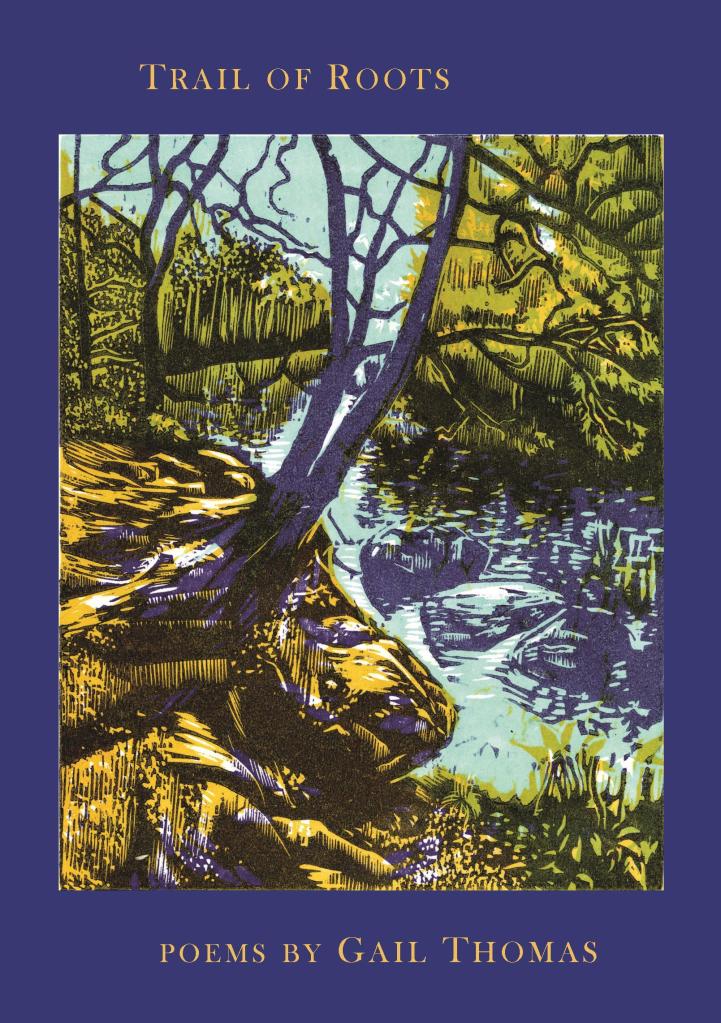Trail of Roots by Gail Thomas
Published by Seven Kitchens Press
Review by Mary Warren Foulk
I have long been an ardent admirer of Gail Thomas. She has been my teacher and mentor. I return to her poems often for inspiration and guidance— for their stunning craft and for their model of humanity, radical honesty, and brave instructions on how to live, how to be a poet in the world, and how to navigate and face the roots of our ever becoming, no matter how challenging or wondrous.
The reverent poems in Trail of Roots are no exception. They are a deepening of her study and evolution as a poet and as a person. These poems traverse history; they also traverse many landscapes: Scranton; Hawk Mountain; Kittatinny Ridge; landscapes of the human heart; and landscapes of a self in transition and transcendence. A mind actively excavating its past to forge its present and future, no matter where the trail may take her, no matter how uncertain the terrain. These are multifold/multifolding journeys— through spirit, through raw emotion, through the undeniability of aging and mortality. The narrator mines the myriad selves—wife, mother, daughter, lover, witness—against the complex backdrop and realities of such American legacies as patriarchy, homophobia, misogyny, and the fragile states and contexts in which women, in which lesbians, too often find themselves.
In her title poem, “Trail of Roots,” Thomas begins,
After I forget what I know about walking,
to be free. This is not a time for Shinrin Yoku,
I hike this trail with my dog who is thrilled
forest bathing, where one walks untethered.
The poem continues,
my eyes
focus only on feet, what lies beneath
and ahead. Tangled web of roots courselike bruised veins at every angle.
And later, she writes “remember years when I used my body and skin //
to feed my children, denied by their father, as if we lived / in a blind alley built of unpaid bills.” Another memory, after a pride march, she:
pushed a stroller and held my other child’s hand while
red faced men screamed at us. Later in our garden
a neighbor spit on the ground, the thick clot daring
me to protect them.
As she makes her way through the canopy, she “hoists myself over [a white pine’s] rough bulk, balance then straddle // before landing on solid ground.”
And yet despite these obstacles, there is forgiveness, wonder, redemption; there is hope, natural beauty, and love. Earned through the many trials experienced and lived authentically and expressed divinely and masterfully. In “Marriage at 63,” Thomas observes,
With children grown, loves
buried, mother and father gone,
our bodies maps of countries
whose names have been changed
[…]And now, this yes
steady as late night coals
glowing and banked.
Having taken Thomas’s classes at Pioneer Valley Writers Workshop, I was privileged to read several of the poems in draft form. Thomas is very generous in sharing with her participants her own pages and process. I was astounded by every draft—for their forms, for their lines, for their metaphorical reach, for their rhythms and sonic power, for their breathtaking beginnings and endings. For their never ending surprise. Thomas is triumphant in her ability to hone a narrative, to weave these multitudinous, interconnected histories and stories, these resonant voices. How she evokes such a range of responses from her readers, and evokes such a desire to return, to read again and anew. I am awed by such layering and depth across the page, and how she uses the white spaces and its possibilities (notable in her “Golden Dust Repairs the Cracked Vessel”), their visual design and intrigue. Such richness across the collection, such a riveting whole.
In two poignant poems, she pays tribute to those who have greatly influenced her, from Lucille Clifton to Adrienne Rich, from Ellen Bass to Jane Kenyon, from Ross Gay to Marie Howe, echoes of her poetic forebears and lineage. She honors these influences in “Cento for Women Who Are Not Believed”:
Now you are a voice in any wind
a succession of brief, amazing movements,
the fragile cases we are poured into,
this woman’s garment, trying to save the skein.
And “Pandemic Cento”: “There are days we live / as if death were nowhere in the background. / The life only wants, the fugitive life.”
I linger in the potent “Leaving Paradise, ” where Thomas shares:
Inside my thick-
walled house, beams stained with ox blood, tradition
echoed in red ware pottery, pierced tin cupboards,
blue and white crocks with stiff-necked plump Dutch
birds, but there were no women like me.Lured down the highways splattered with billboards,
past the sprawl of malls and smoke stacks, I searched
for them in bookstores and meetings, womenwho lived in disguise, a man’s wife kissing another
man’s wife. Let me be clear about this yearning,
its embers stoked by more than a juicy bite,more than feminist books devoured like bread,
more than the company of mothers alone
at night, their men working late. Body
and mind yoked to this cultivated garden
of my own sowing, I chose wilderness.
It’s a gift and an honor to review Trail of Roots, Thomas’s wild sowing and self-assertions, to extol its praises and ensure its broad reception. The gorgeous cover alone, a three-color woodcut by Nancy Haver, invites the reader into discovery and exploration of the reverberant, transformative meanings inside.

Gail Thomas’s previous books are Leaving Paradise (Human Error Publishing, 2022), Odd Mercy (Headmistress Press, 2016), Waving Back (Turning Point, 2015), No Simple Wilderness: An Elegy for Swift River Valley (Haley’s, 2001), and Finding the Bear (Perugia Press, 1997). Her poems have been widely published in journals and anthologies including CALYX, Valparaiso Poetry Review, Beloit Poetry Journal, North American Review, Cumberland River Review, and Mom Egg Review. Among her awards are the Charlotte Mew Prize from Headmistress Press for Odd Mercy, the Narrative Poetry Prize from Naugatuck River Review, the Massachusetts Center for the Book’s “Must Read” for Waving Back, and the Quartet Journal’s Editor’s Choice Prize. She has been a fellow at Ucross and the MacDowell Colony. She teaches poetry, visits schools and libraries with her therapy dog Sunny, and volunteers with immigrant and refugee communities in Western Massachusetts. Read more about Gail and her work at www.gailthomaspoet.com.


Mary Warren Foulk has been published in Fjords Review, The Hollins Critic, Pine Hills Review, Palette Poetry, Silkworm, and Steam Ticket, among other publications. Her work also has appeared in Who’s Your Mama? The Unsung Voices of Women and Mothers (Soft Skull Press),(M)othering Anthology (Inanna Publications), and My Loves: A Digital Anthology of Queer Love Poems (Ghost City Press). Her chapbook, If I Could Write You a Happier Ending, was selected by dancing girl press (2021) for their annual series featuring women poets. Her manuscript Erasures of My Coming Out (Letter) won first place in The Poetry Box’s 2021 chapbook contest. Her manuscript Self-Portrait with Erosion was a finalist for the 2021 Gival Press Poetry Award, and the Inlandia Institute’s 2022 Hillary Gravendyk Prize.
Risa Denenberg is the curator at The Poetry Cafe Online

